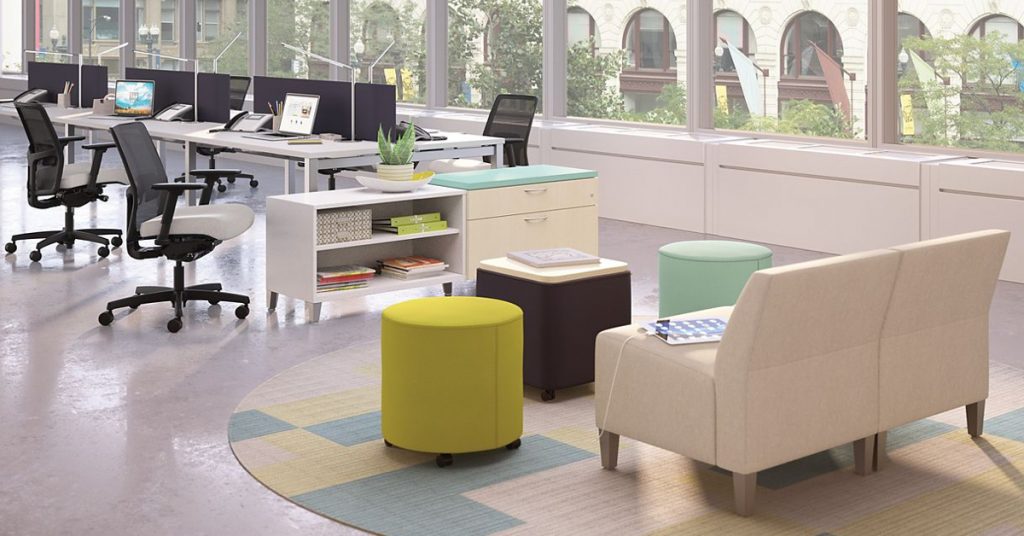Make Your Office a Productive Retreat with these Basic Feng Shui Principles
August 30, 2019
As you might expect, we here at Nolt’s often find ourselves discussing the physical comfort of our customers. We are, after all, an office furniture retailer that specializes in ergonomics. One topic we rarely discuss, however, is the way your furniture and your office layout can impact your employees’ mental health and wellbeing.
One of the best ways to enhance positivity among your team is to introduce the elements of Feng Shui into your office setting. Feng Shui is an ancient Chinese philosophy based on the idea that energy (“chi” or “qi”) should move easily throughout a space in order to produce a more harmonious relationship with the surrounding environment.
You don’t have to dive deep into the complexities of Feng Shui to benefit from its core principles. These tips on how to apply Feng Shui to your office layout can help you create a professional environment that’s welcoming, comfortable, and calm.
Basics of Feng Shui
No, it’s not hocus pocus! The Eastern practice of Feng Shui literally means “wind and water,” and it operates on the belief that universal energy runs through everything. Along with wind and water, wood, fire, and metal comprise the five elements of Feng Shui.
At worst, when you introduce the elements of Feng Shui into your office, you’ll notice it become a neat, organized, and efficient workspace. At best, you should immediately begin to notice an overall feeling of harmony and wellbeing. A more comfortable work environment makes for better productivity and happy employees! You can’t go wrong with Feng Shui.
Furniture the Feng Shui Way
Wood and metal, two of the five Feng Shui elements, are optimal choices for office furniture, especially desks and chairs. Vertical lines give employees a boost, and rectangular desks energize the environment.
Here are some more tips regarding furniture:
- Position chairs in front of a solid wall or choose a chair with a solid backing.
- To suggest moving up the corporate ladder, install tall book cases or shelving behind a desk.
- Choose furniture with rounded corners, but if you can’t, move furniture with sharp corners out of high traffic areas.
Layout for Maximum Energy Flow
One major tenet of office Feng Shui is to place desks in the power position, which means positioning them so they face the door. If you’re worried about distractions in individual offices, place the desks as far from the door as possible, so the room itself dominates the view instead of the doorway.
For cubicles or shared rooms, avoid placing desks back-to-back or face-to-face. Not an option? Use plants, lamps, or photos for privacy, or try low-rise dividers.
**BONUS TIP** Clutter disrupts energy flow, which can lead to spaces filled with bad energy. Piled-up paperwork can be a drag, so choose one day a week to clear your desk and recycle or shred unneeded documents.
Colors Count
Choosing paint for the walls and décor for the office may be more important than you think! Colors aren’t purely subjective; they affect the body physiologically and can impact pulse, blood pressure, and adrenaline.
Consider these color guidelines:
- Calming colors include pale greens, blue-greens, and yellows; purples, pinks, and pastels.
- Stimulating colors include bright reds, vibrant yellows and oranges.
- Earth tones such as hues of brown stabilize a room or office. Gray is considered neutral but too much gray can be draining.
- White can help with focus, but overkill creates a sterile vibe.
- Silver and gold accents: While silver can reduce anxiety and promote calmness, it’s also connected with mental power and learning. It’s no coincidence silver is a popular color in technology spaces. Gold, of course, represents luxury, wealth, and quality. High-end offices are often accented with gold to promote a prosperous, powerful image.
Accessories
Flowers, inspirational quotes, and eye-catching artwork all promote productivity, creativity, and inspiration. Decorate your space with accessories that are consistent with your business or goals. For example, an architect might want to display a photo of a building designed by Frank Lloyd Wright or I. M. Pei to promote the feeling of tranquility and wonder.
It’s important to honor your personality, but remember: the office may not be the appropriate place to display that giant beer mug or fraternity pic from your college days.
Mirrors, Mirrors
Mirrors are an important accessory in Feng Shui, because they are believed to circulate, expand, and deflect energy. If your back must face the door, place a mirror so you can see the space behind you. Mirrors can help open up small spaces and make them feel less cramped.
Whether you’re investing in new office furniture or giving the office a makeover, applying the basic principles of Feng Shui will help you create an environment that’s pleasant, inspiring, and productive.
Visit the showroom at Nolt’s Office Furniture to speak with one of our comfort specialists, who can help you Feng Shui your office with the perfect desks, chairs, and accessories.
